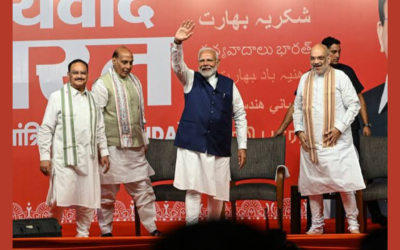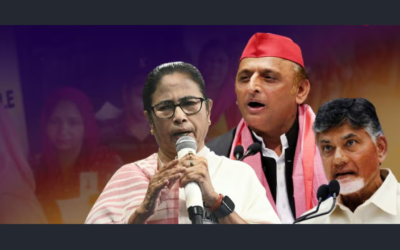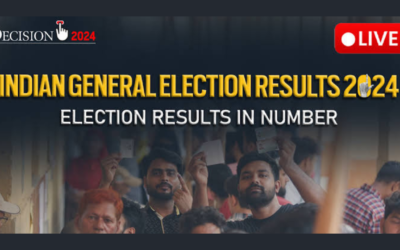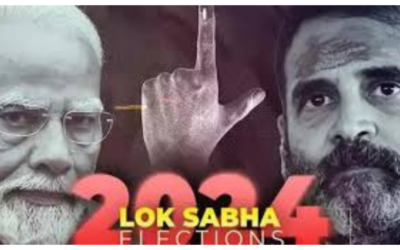2024 Lok Sabha Election Results: Oppressive Atmosphere Clears, Balance Restored

The outcomes have, at the very least, rattled Prime Minister Modi’s authority bubble. This election was all about him. But as of right now, he is simply another politician, moulded by the will of the people.
The general election of 2024 is a historic occasion. For the time being at least, the oppressive loom of authoritarianism, the nauseous winds of communalism, and the air of despair have all lifted. For the third time, the NDA might constitute the government. This is not a landmark to be taken lightly. But this election was not your typical one. There was even the prospect of ongoing politics in jeopardy.
The outcomes have, at the absolute least, rattled Prime Minister Narendra Modi’s authority bubble. He turned this election into an opportunity to showcase his abilities, his omniscience and omnipotence, and his fervour for his beliefs. As things are right now, Modi is neither the people’s god nor the irresistible force of history. He is now just another politician, moulded by the will of the people.
On several fronts, this election portends a significant shift in Indian politics. First of all, it improves the distribution of power among the different political parties. In the absence of this outcome, India was on the path to unbridled BJP supremacy. This domination posed a threat to engulf all resistance, eradicate all political opportunities, and subjugate civil society as a whole. India’s political system is extremely competitive once more. This offers the possibility of accountability as well as checks and balances.
This balance was made possible in part by the Indian coalition, especially in Uttar Pradesh, which remarkably remained united. The BJP has retained its national vote share but has been deprived of seats. If the coalition remains united, it could become a permanent political force. At the very least, it has become a serious contender as an alternative. TINA (There Is No Alternative) is no longer a factor.

This, it must be acknowledged, is a monument to the opposition’s unwavering fortitude in the face of intense scepticism, government targeting, and a hostile media. Rahul Gandhi and Akhilesh Yadav deserve all the praise for convincingly disproving the doubters—including this columnist—forming coalitions, and effectively moving their voters.
Part of the reason for the election was the concerns about the constitution, institutional decay, and threats to democracy. Additionally, a more balanced political environment may provide an opportunity for institutional renewal. More political rivalry gives independent institutions and civil society a sense of empowerment. As a result, it is more difficult to build a fictitious social consensus that weakens people. The very prospect of a power shift challenges the deeply ingrained subordination that exists among India’s independent and elite institutions. Parliament will be more difficult to ignore. Nonetheless, there is a greater chance of internal conflict and struggle within the BJP now that it has lost half of its seats in Uttar Pradesh. The party will now have to develop greater capacity for compromise. It’s unclear if Mr. Modi is capable of carrying out that negotiation. With this election, there’s a chance that political dynamics from 1989 to 2014—when forming coalitions and reaching consensus—will resurface.
This election represents a reorganisation of Indian politics’ social imagination. The BJP has challenged conventional knowledge during the last ten years by reviving Indian politics’ social vision. The first element was the strengthening of the Hindutva identity, which made an attempt to include Dalits and other members of the OBC in an attempt to widen its social base. Additionally, it disregarded minority votes by using fragmented competitions. However, these tactics have reached their limit. There is data that suggests Dalits are more inclined to support the Indian coalition and have shifted away from the BJP. Finally, minorities are able to withstand enough opposition in the Congress and SP.
The second tactic was turning the Hindi heartland into a cultural bloc by taking advantage of the local politics of cultural hostility. This was coupled with the potential to radicalise a sizable portion of the Hindu population. It could have been feasible to radicalise one-third of the Hindu population if we had used shorthand. And with a weak and fragmented opposition, this was frequently sufficient for political victories. It is quite challenging to permanently radicalise the vast majority of Hindus, nevertheless. The prime minister made repeated attempts to do this by playing on themes of wrath and resentment. Because of how effective this tactic was, even the BJP’s detractors started to regard the Hindi heartland as an unbreakable bloc and tried to advocate for a North-South split in its place. The debunking of this fallacy is the big story of this election. The more important lesson, though, is that politics can now be rearranged in many circumstances and is no longer exclusively based on social identity.
Another intricate topic is the Indian economy. The results of the election do not entirely refute the BJP’s economic achievements. There was no generalised rage. However, it highlights the shortcomings of welfare coalitions. A decade ago, Congress realised that it had been stalled after making progress on basic structural improvements and welfare. The BJP moved quickly to make this attempt because they were better at taking political credit. Welfare coalitions, which are still disconnected from the Indian political system, do, nevertheless, function for a term or two without bringing about significant structural changes in the economy. Any government is rendered vulnerable by this.
Ultimately, the illusion that the BJP is a distinct party is also shattered by this election. The Prime Minister’s wish to portray the BJP as virtuous and its serious shortcomings are poles apart, as seen by its flagrant institutional corruption, total indifference to institutional integrity, and the severity of its public speech. Prime Minister Modi is still well-liked. But instead of a leader, what the public witnessed during this campaign was a self-promotional individual enmeshed in his own conceit. And as usual, his weakness sprung from this love of himself.
These kinds of elections make it difficult for both the opposition and the incumbent party to understand the outcomes and how they will affect policy. Although Mr. Modi has displayed some humility, the societal structure he has built—communalism and alertness—will not go away quickly. It could cause one to isolate oneself.
This election serves as evidence that consolidating power is not a magic bullet for India. However, would a new political structure enable the kind of agreement on policies that can foster the conditions necessary for the advancement of the country? That remains to be answered. For the time being, it’s a chance to enjoy the sweet nectar of freedom that increases political rivalry.






